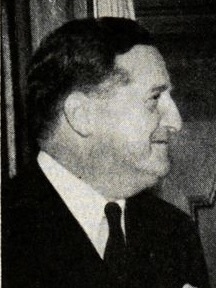| This article needs additional citations for verification. Please help improve this article by adding citations to reliable sources. Unsourced material may be challenged and removed. Find sources: "Herschel Johnson" – news · newspapers · books · scholar · JSTOR (May 2013) (Learn how and when to remove this message) |
| Herschel Johnson | |
|---|---|
 | |
| United States Ambassador to Brazil | |
| In office July 22, 1948 – May 27, 1953 | |
| President | Harry S. Truman Dwight D. Eisenhower |
| Preceded by | William D. Pawley |
| Succeeded by | James S. Kemper |
| United States Ambassador to the United Nations Acting | |
| In office June 3, 1946 – January 14, 1947 | |
| President | Harry S. Truman |
| Preceded by | Edward Stettinius Jr. |
| Succeeded by | Warren Austin |
| United States Ambassador to Sweden | |
| In office December 12, 1941 – April 28, 1946 | |
| President | Franklin D. Roosevelt Harry S. Truman |
| Preceded by | Frederick A. Sterling |
| Succeeded by | Louis G. Dreyfus Jr. |
| Personal details | |
| Born | Herschel Vespasian Johnson (1894-05-03)May 3, 1894 Atlanta, Georgia, U.S. |
| Died | April 16, 1966(1966-04-16) (aged 71) Charlotte, North Carolina, U.S. |
| Political party | Democratic |
| Education | University of North Carolina, Chapel Hill (BA) Harvard University (JD) |
Herschel Vespasian Johnson (May 3, 1894 – April 16, 1966) was a U.S. diplomat from North Carolina. He was the great-grandson of Governor Herschel Vespasian Johnson. He served as a U.S. Foreign Service Officer from 1921 to 1953, and his career included posts in Europe, Latin America, and the United Nations.
He served as Envoy Extraordinary and Minister Plenipotentiary to Sweden between 12 December 1941 and 28 April 1946. Thereafter, he served as the acting US ambassador to the United Nations between 1946 and 1947. In 1948, he was appointed Ambassador Extraordinary and Plenipotentiary to Brazil.
During his time in Sweden, he made humanitarian efforts to save civilian lives and was in touch with Raoul Wallenberg.
He was a vocal proponent of the 1947 Palestine Partition Plan. The outcome of the UN vote is attributed to his collaboration with Andrei A. Gromyko, otherwise Johnson's political opponent. They both stood together on this issue and urged the General Assembly not to delay its decision but to vote for partition at once, opposing last-minute efforts of Arab delegations to effect a compromise.
References
- Herschel Vespasian Johnson (1894-1966). Office of the Historian, Bureau of Public Affairs, United States Department of State. Retrieved July 13, 2013.
- "Johnson, Herschel Vespasian | NCpedia". www.ncpedia.org. Retrieved May 29, 2019.
External links
| Diplomatic posts | ||
|---|---|---|
| Preceded byFrederick A. Sterling | United States Ambassador to Sweden 1941–1946 |
Succeeded byLouis G. Dreyfus Jr. |
| Preceded byEdward Stettinius Jr. | United States Ambassador to the United Nations Acting 1946–1947 |
Succeeded byWarren Austin |
| Preceded byWilliam D. Pawley | United States Ambassador to Brazil 1947–1953 |
Succeeded byJames S. Kemper |
| Chargé d'Affaires |  | |
|---|---|---|
| Envoy Extraordinary and Minister Plenipotentiary | ||
| Ambassador Extraordinary and Plenipotentiary |
| |
| United States ambassadors to Sweden | ||
|---|---|---|
| Minister Plenipotentiary |  | |
| Chargé d'Affaires | ||
| Minister Resident | ||
| Envoy Extraordinary and Minister Plenipotentiary | ||
| Ambassador Extraordinary and Plenipotentiary | ||
- 1894 births
- 1966 deaths
- Ambassadors of the United States to Sweden
- American people of World War II
- Permanent Representatives of the United States to the United Nations
- Raoul Wallenberg
- United States Foreign Service personnel
- University of North Carolina at Chapel Hill alumni
- Harvard Law School alumni
- Ambassadors of the United States to Brazil

